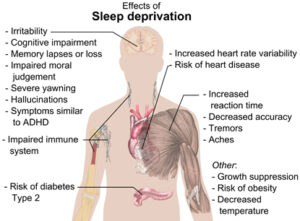Sleeping is good. Unfortunately, many of us are just not getting enough of it.
“Sleep plays a crucial role in maintaining good health and overall well-being,” says Dustyn Shroff, Vice President of GreatFlorida Insurance, Florida’s largest independent health insurance agency.
Importance of Sleep
To some, sleep may seem unproductive. However, during this time our bodies and brains are hard at work supporting our mental and physical health. Research shows sleep helps us to make better decisions, spark creativity, pay attention and aid in problem solving.
It also helps to control our emotions and behavior. Pediatric neurologist and sleep specialist, Dr. Shai Marcu explains in his TED-Ed lesson, “How sleep restructures your brain in a way that’s crucial for how our memory works.”
Sleep not only benefits brain function, but is critical to the function of our organs. It improves circulation, restores our immune system and promotes growth and development in teens and children, playing a role in puberty and fertility. During this time our muscles, heart and blood vessels receive healing and repair.
Obstacles to Sleep
While most people long for a good night’s sleep, culprits such as stress, illness and hormones, along with bad habits can sabotage your nighttime plan.
“If you have trouble sleeping, talk to your doctor about your prescription medication,” advises Buck with GreatFlorida Insurance, Florida’s top independent health care insurance agency. A side-effect to certain medications could be robbing you of vital sleep. Oral contraceptives, steroids, antidepressants, along with pseudoephedrine, diet pills, high blood-pressure and breathing medications can contribute to a lack of sleep.
Just as sleep benefits our physical and mental health, a lack of sleep has detrimental effects. According to the National Institutes of Health (NIH), sleep deficiency can lead to depression, risk-taking behavior and suicide. “Ongoing sleep deficiency is linked to an increased risk of obesity, heart disease, kidney disease, high blood pressure, diabetes and stroke.
After all, being sleep deprived is no way to live. If you are not feeling rested after a night’s sleep, you should talk to your doctor to see if you have a sleep disorder or other health problem.





